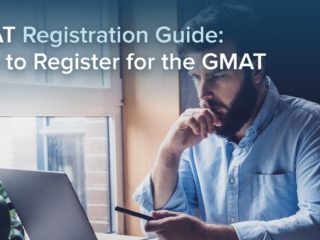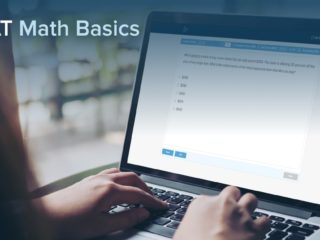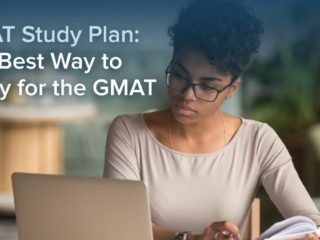| Getting your Trinity Audio player ready... |
Last Updated on September 10, 2024
The Graduate Management Admission Council (GMAC), the maker of the GMAT exam, offers a variety of GMAT testing accommodations for people with disabilities or health-related needs. If you need test-day accommodations, you probably have questions about how to get them and what exactly is available.
So, in this article, we’ll discuss the major aspects of GMAT accommodations for disabilities, including:
- types of GMAT accommodations
- accommodations for the in-person vs. online GMAT
- who receives accommodations
- when and how to request accommodations
and more.
In our discussion, we’ll touch on common areas of concern for test-takers seeking accommodations, such as taking the GMAT with dyslexia or ADHD, taking medicine during the GMAT, and receiving additional test time or additional or extended rest breaks.
Here are all the topics we’ll cover:
- Types of GMAT Disability Accommodations
- Who Qualifies as a Test-Taker with Disabilities?
- When to Request GMAT Accommodations
- How to Request GMAT Accommodations
- Frequently Asked Questions (FAQ)
- GMAT Disability Accommodations: Key Takeaways
- What’s Next?
To start, let’s discuss the types of GMAT disability accommodations available.
Types of GMAT Disability Accommodations
Many GMAT students have heard that it’s possible for a test-taker with disabilities to get 50% or 100% additional test time, an additional rest break, or extended rest breaks on test day. In fact, additional time and breaks are among the most commonly requested GMAT disability accommodations.
However, there are a whole host of other accommodations available to test-takers who qualify. Some other GMAT accommodations include:
- a reader who can read items to the test-taker
- a recorder who can record test-taker responses
- a sign-language interpreter for the hearing impaired
- JAWS software, a screen reader that assists visually impaired test-takers
- Zoom Text software or enlarged font on the PC monitor
- the use of a trackball mouse
- the use of a medical device that is not attached to the test-taker’s body
- wheelchair accessibility
- 2 days to complete the test, instead of 1
You also can request another type of accommodation if you do not see the one you need on that list.
With that in mind, let’s review what types of items don’t require an accommodation request for the GMAT.
KEY FACT:
You can request accommodations that are not on GMAC’s list.
Items That Do Not Require an Accommodation Request
There are some items that you can have in the testing room with you for which you don’t need to request an accommodation from GMAC. Those items include:
- eyeglasses
- a nonelectric, handheld magnifying device
- hearing aids
- an attached insulin pump
- a neck brace or collar
- a pillow to support your neck or back, or to support an injured limb
At your test center, you can also request earplugs or noise-canceling headphones, an adjustable-height chair, and a mouse for left-hand use instead of right-hand use.
While you can simply request those items when you arrive at your testing appointment, you may want to contact your test center in advance to ensure the item you’ll request will be available. Not all test centers have the same equipment. So, adjustable chairs may be available at one test center but not another, for example.
KEY FACT:
The use of some common items, such as eyeglasses, hearing aids, and earplugs, does not require requesting accommodations from GMAC.
So, we know what types of GMAT accommodations are offered and which items don’t require accommodations. Now let’s discuss who can receive accommodations on the GMAT.
Who Qualifies as a Test-Taker with Disabilities?
GMAC has 5 categories of disabilities for which it offers GMAT accommodations:
- Attention Deficit Hyperactivity Disorder (ADHD)
- Learning and Cognitive Disorders
- Psychological Disabilities
- Physical and Systemic Disabilities
- Sensory Disabilities (Vision and Hearing)
As we can see, some of the categories above are fairly broad. So, there are many different disabilities that may qualify for accommodations. That said, to get a better sense of what the categories above include, let’s look at some commonly cited disabilities among GMATtest-takers seeking accommodations.
Commonly Cited GMAT Test-Taker Disabilities
Commonly cited GMAT test-taker disabilities include:
- ADHD
- dyslexia and dyscalculia (Learning and Cognitive Disorders)
- a range of vision and hearing impairments, including but not limited to blindness and deafness (Sensory Disabilities)
- anxiety and depression (Psychological Disabilities)
- mobility and dexterity impairments and chronic illnesses such as cancer, lupus, cerebral palsy, and multiple sclerosis (Physical and Systemic Disabilities)
Of course, there are many other disabilities that may qualify you for GMAT accommodations. So, no test-takers should be discouraged from seeking necessary accommodations — or assume that they’re less likely to receive accommodations — because they have disabilities that are not among the most common.
Also, test-takers who have disabilities that are commonly cited cannot assume that they will automatically be granted accommodations on test day. For example, additional testing time (50% or 100%) is probably one of the more common GMAT ADHD accommodations.
However, test-takers with ADHD are not automatically granted that accommodation—or any other. All test-takers seeking GMAT disability accommodations must provide substantial documentation that clearly shows that a given disability will affect their ability to take the GMAT.
We’ll talk more about that process shortly. But before we discuss how to request GMAT accommodations, let’s look at when to request them.
When to Request GMAT Accommodations
First things first: you must submit your request for GMAT accommodations BEFORE you schedule your GMAT exam. Testing appointments with accommodations are different from those without. So, if you’ve already scheduled a testing appointment that does not include accommodations, you will not be able to simply “add” the accommodations to that testing appointment later.
Also, you can’t schedule an appointment with accommodations until you’ve actually received approval from GMAC.
So, don’t register for a GMAT exam for which you need accommodations until your request has been approved.
Secondly, and just as importantly, you should give yourself ample time before your desired test date to make your accommodations request. For one, you will need to gather supporting documentation for your request, including documentation from a healthcare provider. So, you may need to schedule an appointment with your healthcare provider as part of that process.
Additionally, it can take up to 30 days to receive a decision after you submit your request for accommodations.
So, definitely give yourself a nice cushion of time to submit your accommodations request and hear back from GMAC. You’ll be notified in writing if your request is approved, and along with that letter, you’ll receive instructions on how to schedule your accommodated testing appointment.
TTP PRO TIP:
Give yourself a generous cushion of time to gather documentation, submit your accommodations request, and receive a response from GMAC.
Now, let’s discuss how to submit your request.
How to Request GMAT Accommodations
If you plan to submit a request for GMAT disability accommodations, the first thing you’ll need to do is create an account on GMAC’s website, mba.com. Remember, this is not the time to register for your GMAT exam! However, creating an mba.com profile will give you an ID number and allow you to eventually complete the online application process for accommodations.
To complete that online application process, visit GMAC’s Testing Accommodations page. On that page, click on the button labeled “Apply for Accommodations” to submit your application.
KEY FACT:
You must submit your accommodation request online through your mba.com account.
Required Documents
One of the documents you’ll need to submit with your application is the GMAT Test Accommodation Request Form. On that form, you’ll need to provide some basic contact information, information about the nature of your disability, and information about any previous accommodations you’ve received in school, from employers, or on standardized exams.
You will also need to write a statement called an “accommodations rationale,” in which you, in your own words, describe how your disability will affect your ability to take the GMAT and explain why you need each accommodation you’re requesting. So, you’ll want to give yourself some time to craft that statement, so that you’re clearly and specifically communicating your needs.
Along with your request form, you’ll need to submit all of the documentation required for your specific disability type, including any required documentation from your healthcare provider.
Each of the 5 disability categories GMAC outlines has its own documentation requirements. You can find the requirements for each disability type in GMAC’s Supplement for Test-Takers with Disabilities. Carefully read the introductory information and general guidelines in that supplement as well as the guidelines for your disability type. Guidelines for your disability type may require further written statements from you.
Within 24 hours of your submitting an accommodation request, your mba.com account will be updated to reflect your submission.
Note that, if you received approval for GMAT disability accommodations within the last 2 years and the documentation you submitted then is still current, you may request the same accommodations for another GMAT exam without re-submitting the documentation listed in the GMAC Supplement. However, you will need to complete and re-submit the Test Accommodation Request Form.
Now that we’ve learned all about GMAT accommodations for disabilities, let’s answer some frequently asked questions.
Frequently Asked Questions (FAQ)
Can you get extra time on the GMAT Online?
Good news: additional testing time of 50% or 100% is available for both the online and in-person GMAT. Likewise, additional or extended rest breaks are available for the GMAT Online, just as they are for the in-person GMAT.
Keep in mind that among people taking the GMAT, extra time is probably the most common accommodations request. But GMAC doesn’t grant extra time willy-nilly. GMAC is serious about ensuring that the playing field is as level as possible for all GMAT test-takers. So, you will need to provide substantial proof that your specific disability necessitates extra testing time.
Also, if you’re planning to take the GMAT Online, keep in mind that not all of the disability accommodations available for the in-person exam are available for the online version. For instance, people who might assist test-takers during an in-person test administration are not available to go to test-takers’ homes. So, GMAC can’t provide online test-takers with a reader who can read items to them or a recorder to record test responses.
Additionally, some special software, such as software to assist visually impaired test-takers, may be available only for in-person tests.
If you receive approval for accommodations, GMAC will inform you of which types of test administration offer your accommodations.
Can you take the GMAT with dyslexia?
Yes! Plenty of test-takers with dyslexia have taken the GMAT. And there are a variety of GMAT accommodations that can be helpful for test-takers with dyslexia, such as additional test time or a reader.
That said, test-takers with dyslexia should not assume that GMAC will grant them an accommodation, or all of the accommodations they request, if they request more than one. GMAC makes its accommodations decisions on a case-by-case basis, not according to disability type. There is an appeal process, however, if you feel that your accommodation request has been unjustly denied.
Of course, test-takers with dyslexia also shouldn’t assume that they will be unable to succeed on the GMAT without accommodations. You may consider working with a tutor if you need extra help in preparing for your exam.
How can I take medicine during the GMAT?
If you need to take medicine during the GMAT, you can store it in your locker outside the testing room and take it during your breaks without receiving any special approval or applying for an accommodation. The same goes for food and drinks. (This article has more information about items allowed at test centers.)
Will schools know I received GMAT disability accommodations?
No! Any disability information or medical records you share with GMAC are kept confidential. GMAC does not give schools any information about your disability status or accommodations you applied for or received. And your score reports will not include any indication that you took a GMAT exam with accommodations.
Are legacy GMAT and GMAT accommodations the same?
If you previously took the legacy GMAT and are gearing up to take the GMAT, you may be wondering whether the new test offers the same accommodations as the previous one. Good news: GMAC offers the full range of accommodations for the GMAT that were offered for the legacy GMAT. So, while the test is different, the types of accommodations are not.
Furthermore, the process of requesting GMAT accommodations remains the same. So, if you requested accommodations for the legacy GMAT in the past, there is no need to worry that you’ll face a different procedure this time around.
GMAT Disability Accommodations: Key Takeaways
At the end of the day, GMAT disability accommodations are designed to provide test-takers with disabilities equal access to the GMAT and an equal opportunity to demonstrate their skills and knowledge. So, although the process of applying for GMAT accommodations may seem a bit intimidating at first, don’t shy away from seeking the accommodations you need! Also, remember the following:
- You do not need to request accommodations to wear eyeglasses or hearing aids during the GMAT or to access medications, food, or drinks during your breaks.
- You must submit a request for GMAT accommodations online BEFORE you schedule your GMAT exam.
- It can take up to 30 days to receive a decision after you submit your request for accommodations.
- Different disability types have different documentation requirements for accommodation requests.
- GMAC makes accommodations decisions on a case-by-case basis. There is no guarantee that a request will be approved.
- GMAT score reports do NOT show disability or accommodations information.
What’s Next?
Check out our guide to getting a GMAT fee waiver and our article about how many times you can take the GMAT.
You also may be interested in these free GMAT study resources.



